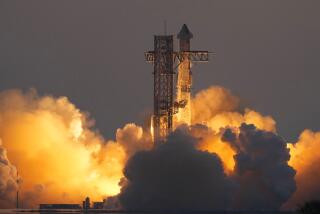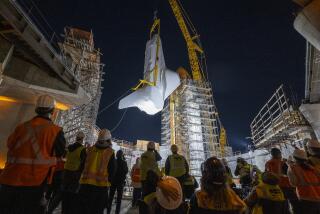Shuttle Crew Recovers Spartan Despite Trouble
- Share via
KENNEDY SPACE CENTER, Fla. — Endeavour’s astronauts chased and recovered a solar-science satellite Sunday that was spinning and facing the wrong way because of a power problem.
NASA will not know whether the telescopes on the Spartan satellite collected any data until the space shuttle Endeavour returns to Earth next week and is unloaded.
Commander David Walker and his crew discovered that the satellite had shut down automatically when they pulled up to retrieve it two days after releasing it.
Walker was forced to steer Endeavour around the satellite. As the two craft zoomed around Earth at 5 miles per second, he painstakingly lined up Endeavour’s crane with the grapple pin on Spartan.
More than half an hour later than planned, astronaut Michael Gernhardt reached out with the crane and grabbed the satellite. He hauled the 2,800-pound boxy craft into the cargo bay, where it will remain for the rest of the 11-day mission, expected to end next Monday.
The 230-mile-high rendezvous in orbit was one of the shuttle mission’s major objectives.
Ground controllers suspect that Spartan went into a safe, shutdown mode because of weak batteries or a depletion of steering fuel, said NASA manager Craig Tooley.
The heaters inside the satellite were warm, indicating that everything was working until just before Endeavour showed up, Tooley said.
“We believe that the most likely scenario is that the mission was a complete success,” Tooley said.
During its two days of free flight, the $8-million satellite was programmed to observe streams of charged particles hurtling from the sun’s north pole at 500 miles per second. Gusts of this so-called solar wind can knock out power plants on Earth and interrupt radio signals.
With Spartan back on board, the five astronauts turned their attention to another satellite, a large, steel disk intended for electronics research.
The astronauts plan to release the $25-million Wake Shield Facility today and recapture it two days later. Physicists expect the satellite to create an ultra-clean vacuum in its wake that should be ideal for producing super-thin semiconductor film.
More to Read
Sign up for Essential California
The most important California stories and recommendations in your inbox every morning.
You may occasionally receive promotional content from the Los Angeles Times.













